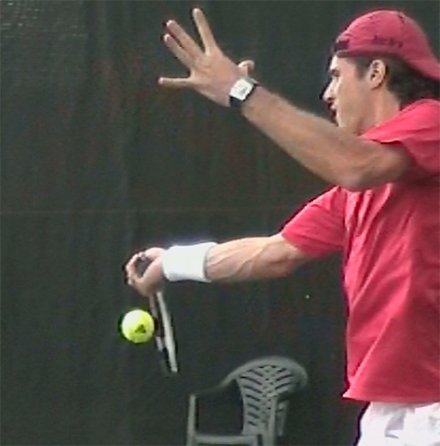Leverage is the most significant difference between the Classical Teaching Model and the New Playing Style. Leverage is defined as "advantageous position." Perhaps the most significant aspect of this "advantageous position" that creates leverage is the position of the BODY BEHIND THE HANDS. Modern grips, stances, footwork, weight shift, and timing have resulted in a position that puts the body behind the hands.- Doug King
The Leverage Game: Get Behind It
Imagine yourself in front of a large barrel of water. If you hit it with your hand, it will barely move. If you push it, you may tip it over. Top pros use this concept in tennis.- Oscar Wegner
Play Better Tennis in 2 Hours
"Racket head speed" is the number one phrase I hear when commentators and coaches are talking about the modern game. However, as Doug King notes in his brilliant article, The Leverage Game: Get Behind It, as well Oscar implies in his wonderful quote, there is an equally important dynamic at work: Leverage. Leverage means hittng the ball in front of the body. But it also means having the arm slightly rotated backwards with the elbow in front of the body on contact.
Watch how Olga brings her arm forward to the ball, with the butt cap leading the way, so she can meet the ball way in front of her body with her shoulder and arm positioned solidly behind the ball for maximum leverage. She establishes the exact same contact positon Tommy Haas does in the image below her. Palm more under the handle and forearm rotated backwards a bit (aided by the semi-western/western grip). Elbow positioned in front of the body (from the pulling motion).
If you forget about speed for a moment, think about what this positioning of the shoulder, arm, hand and forearm rotated backwards gives you. It gives you a solid wall of compression behind the ball. The tennis ball will push into the spring bed, compress, and then spring back in a spring like release. That's the leverage that King talks about in his article, and it's the position of pushing that Wegner talks about. You then powercharge the leveraged spring effect with a thrust upward, push forward, and some forearm rotation to aid spin.

